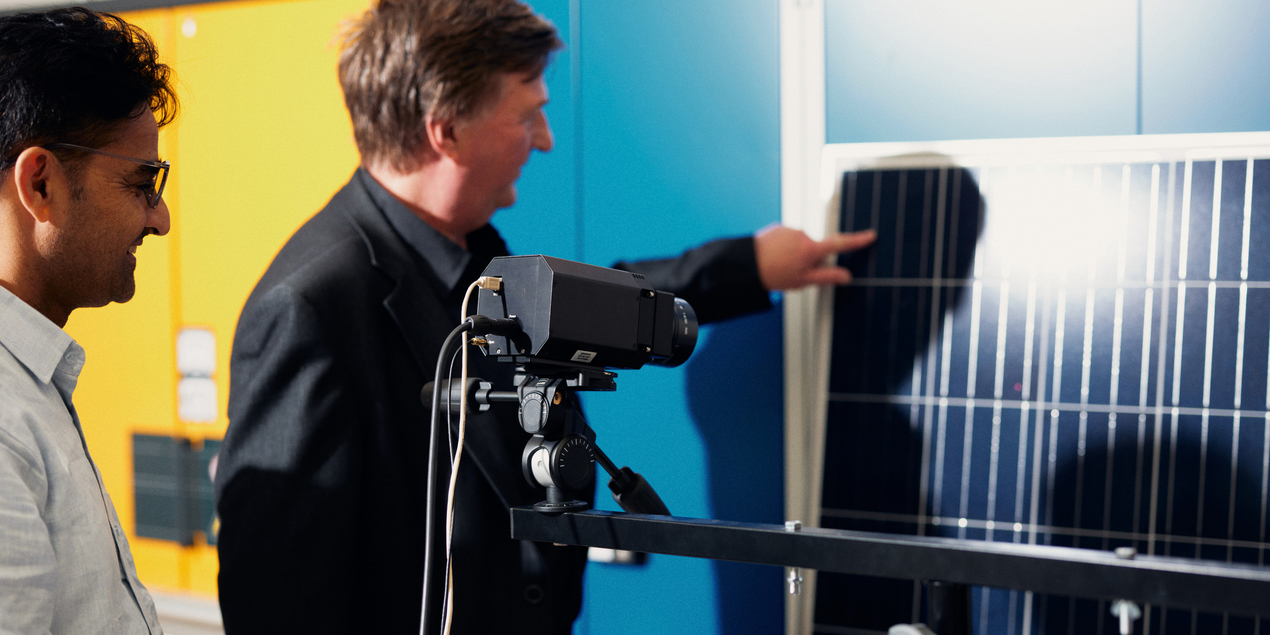- Home
- About
- International Office
- Academics
- Research and Transfer
Research on Sustainable Technologies from an Equal Opportunities Perspective: HSBI’s New Horizons Fellowship Makes It Possible for Visiting Scholar from Bhutan
Since August, visiting scholar Dr. Hari Kumar Suberi from Bhutan has been conducting research on sustainable technologies as parts of networked systems on HSBI’s Minden Campus, focusing on women as disseminators of technologies. Suberi’s stay was made possible by the “New Horizons Fellowship,” which is being awarded to researchers from the Global South with reference to equal opportunities issues for the first time this year.
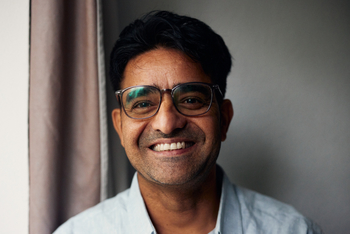
Minden (hsbi). Dr. Hari Kumar Suberi closes his eyes. He is sitting on the floor cross-legged, his palms touching the carpet. Contemplative silence fills the small room. Until Suberi opens his eyes again. They are sparkling. “I start my work day with meditation to connect with Mother Earth,” says the electrical engineer who holds a doctorate in sustainable development and a master’s degree in international material flow management. Material flow managers try to influence material and energy flows ecologically and economically with the aim of conserving resources and creating sustainable cycles.
Women are often key in setting sustainable developments in motion
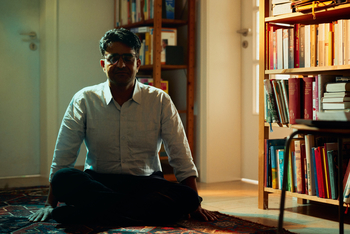
Having braced himself like that, Hari Kumar Suberi spends his work day on HSBI’s Minden Campus, where he has been conducting research since August thanks to receiving HSBI’s first “New Horizons Fellowship.” From now on, it will be awarded by the Central Gender and Diversity Officer once a year and will finance a four to six-month stay at HSBI for researchers from the Global South to develop or process projects relating to equal opportunities issues. “We are interested in new teaching and research perspectives on equal opportunities. In the Global South, it is particularly evident that sustainable development and the promotion of women go hand in hand,” says HSBI’s Gender and Diversity Officer Prof. Dr. Yüksel Ekinci. “In addition, we intend to strengthen our contacts to the Global South and build new university partnerships.” The fact that a man has received the equal opportunities fellowship does not bother Ekinci at all: “Dr. Suberi’s work in Bhutan aims to improve expertise in dealing with sustainable technologies. His special focus lies on women who shape the social and family life in rural communities.”
But let’s start at the beginning. Suberi’s home university is the Royal University of Bhutan, or to be more precise, the College of Science and Technology (CST) in Phuentsholing in the south of the country. From the foot of the Himalayas, Suberi went directly to the North German Plain – which for him was not a ‘nature shock’ at all: “To be honest, I really like the fact that it is so flat here and that you can look into the distance,” Suberi says and smiles. He is a polite person, and he also praises German food: “The taste is simple, but good. Bhutanese cuisine is sometimes even too spicy for me.” However, what he likes particularly is the fact that HSBI has anchored sustainability in its mission statement – after all, sustainability is Suberi’s topic. In Bhutan, it is almost a matter of course: The Himalayan kingdom has enshrined environmental protection in its constitution and regularly achieves a carbon neutral footprint. What seems to be very progressive from a Western perspective is actually due to the country’s history. Suberi: “The veneration and respect for nature are among the traditional Bhutanese spiritual values. In addition, in Bhutan, the constitution now also protects the environment and promotes sustainable progress, which is unique.”
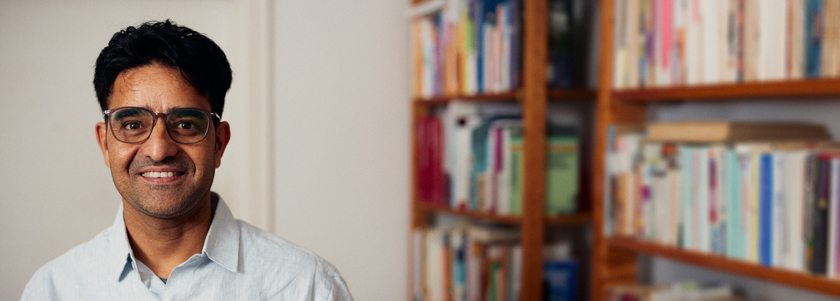
Transdisciplinary approach improves the efficiency of sustainable technology use
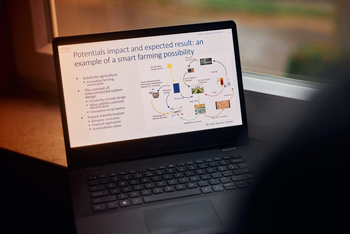
Nevertheless, the resources used for this are by no means just old and traditional. For example, after his studies, Suberi conducted numerous citizen consultations on the use of sustainable technologies such as photovoltaic systems and noticed something peculiar: “Although the devices were technically sound and sustainable, people simply did not use them.” They were too complicated to use and maintain, their benefits for society were too little known and they did not fit in well with the community structures. “This observation was a turning point in my work,” says Suberi, who then took a broader approach to research on sustainable technologies.
On the armchair by the window lies an open book about networked thinking. “We cannot focus on technologies alone,” Suberi says. “They may be key factors in transforming a system sustainably and reducing energy and material consumption, making work easier and minimising negative impacts on the environment – however, they must not be seen as an independent socio-ecological challenge, but as part of a networked system. Society, economics, the environment and the community are also part of this and must be taken into account if technologies are to work.” This is why, for his project, he relies on women as a kind of integration force within the system for the dissemination of sustainable technologies in Bhutan. “Women are creative agents for change in Bhutan’s social system; they are usually more innovative than men. It is important to encourage their involvement in the process of sustainable development by appropriately giving them access to knowledge about sustainable technologies.”
HSBI’s Welcome Center supports the organisation of the stay

Now for the technologies: Hari Kumar Suberi puts on his jacket and slips into his shoes. It is only a short walk from his flat to Minden Campus. The path leads through cobbled streets, past centuries-old villas and modern apartment buildings. HSBI’s Welcome Center has helped him find accommodation. “That was a great help,” says Suberi. “Finding accommodation, getting a visa and health insurance are real challenges when organising a research stay in Germany.”
On Minden Campus, Prof. Dr. Frank Hamelmann is already waiting. The physicist is an expert in photovoltaic systems and Suberi’s host at HSBI. The two had already known each other from previous online collaborations. “The exchange has been very fruitful so far, it broadens our horizons. Bhutan has a unique approach in society from which we can learn,” Hamelmann says. He is particularly interested in other cultures’ perspectives: “What is it exactly that people need there?”
Can be used everywhere: smart software monitors photovoltaic systems
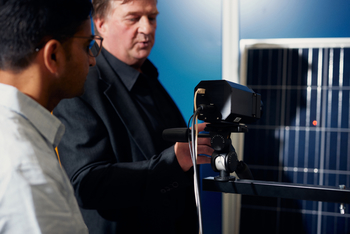
Renewable energies, especially photovoltaics, are an important topic in Bhutan, and expertise and specialists are in demand. “We have the technical expertise,” says Hamelmann, looking around in the photovoltaics laboratory. “But what specific requirements are there for use in Bhutan with regard to the climate and also to society? What must the technology be like?” Suberi replies immediately: “It must be simple and user-friendly. The community must be able to adopt it easily, it must create added value and deeper interest in social value.” Such as environmental protection. For Suberi, this is exactly what the technical process Hamelmann and his team are currently conducting research on is achieving: cost-effective monitoring of photovoltaic systems. “We are developing software that can be used at any time to easily check whether a system is working properly,” explains Hamelmann. “Not only does this save time-consuming and expensive maintenance by a technical specialist, but it also helps identify error sources immediately. This also avoids losses due to modules that may not have been working properly for months undetected.”
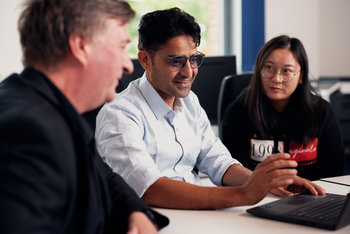
Suberi uses his time at HSBI to learn more about Hamelmann’s procedure until returning to Bhutan in January. Even if he does not miss the high mountains, he is very much looking forward to seeing his family again, says the father of a thirteen-year-old daughter and a five-year-old son. The end of his stay in Minden does not mean the end of the exchange with HSBI. On the contrary, Hamelmann stresses: “We have already applied for a collaboration project for the exchange of students and teaching staff with the German Academic Exchange Service and are preparing further collaborative research projects.” Maybe Suberi will not have to say goodbye to the North German Plain for too long. (uh)
For more photographic material, please contact presse@hsbi.de.

